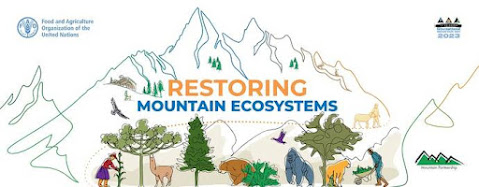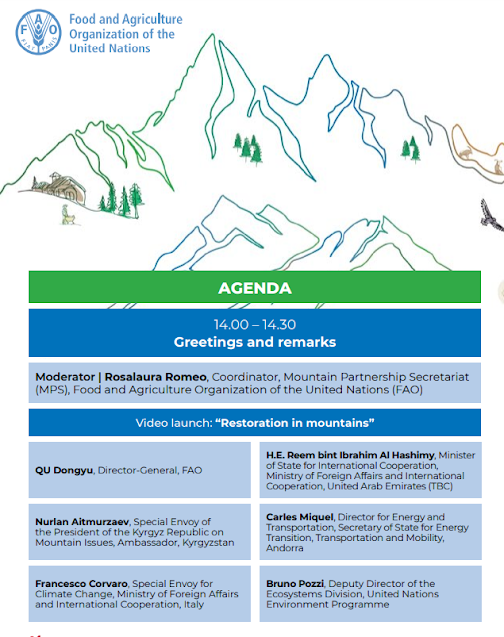As the COP28 continues, a panel discussion will held by the UNDP Buthan ahead of #MountainDay, we take you to Lunana, one of the highest human settlements on earth. Home to 3 of Buthan’s 17 high risk glacial lakes, Lunana lives in constant fear of #GLOF as glaciers melt fast. What actions we need to develop to reduce fthe impacts of Climate change on mountains water ecosystems.
On December 13th, from 14.30–16.00 CET online, the Mountain Partnership Secretariat and the FAO-led UN Decade Task Force on Best Practices will host a technical session “Sharing knowledge throughout the UN Decade on Ecosystem Restoration: Good practices for the restoration of mountain ecosystems” to showcase and share good practices for restoration of mountain ecosystems. The event will be broadcast on Zoom – details here.
FESTIVAL: Taking place every year in the run-up to or on International Mountain Day on December 11th, the Reading Mountains Festival 2023 will offer us an opportunity to showcase and celebrate the literary and cultural diversity of the Alps. This year, the Festival enters its ninth edition, and if you have never been part of it, we warmly invite you to join in and organise (or attend) an event! Learn more about the Ninth edition of the Reading Mountains Festival.
STATEMENTS: Read the statement of the United Nations Secretary-General on the International Mountain Day 2023.
Statement by David Cooper Acting Executive Secretary of the Convention on Biological Diversity International Mountain Day 2023; December 11th.
This International Mountain Day 2023, we reflect on the crucial importance for human well-being of these majestic ecosystems and seek to raise awareness of the possibility for action under the theme "Restoring Mountain Ecosystems". Mountains encompass nearly 27 percent of the Earth's land surface, standing as some of the most unique and inspiring landscapes. They are biodiversity-rich, hosting half of the world's biodiversity hotspots, and serve as sources of freshwater for almost half of humanity. Climate change, overexploitation, land use and contamination change represent the greatest threats to mountain biodiversity. Climate change affects water flow and glacier areas, forcing mountain species and communities to adapt or migrate. Ecosystem conversions for farming, settlements, or infrastructure on steep slopes can lead to soil erosion and habitat loss, impacting water quality downstream. Alarmingly, up to 84 percent of endemic mountain species are at risk of extinction, according to the Intergovernmental Panel on Climate Change. Mountains, despite their magnificent landscapes, are particularly fragile ecosystems. This fragility underpins the urgency for our collective commitment and effort to restore and protect them. Restoration is a critical action to secure the supply of crucial ecosystem services and functions that deliver direct benefits to people, such as climate change adaptation and mitigation, reducing erosions, water provisioning, and increasing soil fertility. Mountain restoration and rehabilitation support local livelihoods and reduce human-wildlife conflicts. The adoption of the Kunming-Montreal Global Biodiversity Framework under the Convention on Biological Diversity in December 2022 calls for the conservation of at least 30 percent of the Earth's ecosystems and for 30 percent of degraded areas of ecosystems to be under restoration. We must join forces to effectively move the Framework from agreement to action and safeguard the diversity of mountain landscapes. On this International Mountain Day 2023, let us increase awareness and call for the restoration of mountain ecosystems that enhance resilience, reduce vulnerability and secure the well-being of future generations and our planet.
CBD Executive Director.
Enter the 2023 Mountains Matter photo contest for International Mountain Day by capturing ecosystem restoration in mountains through your lens.





No comments:
Post a Comment